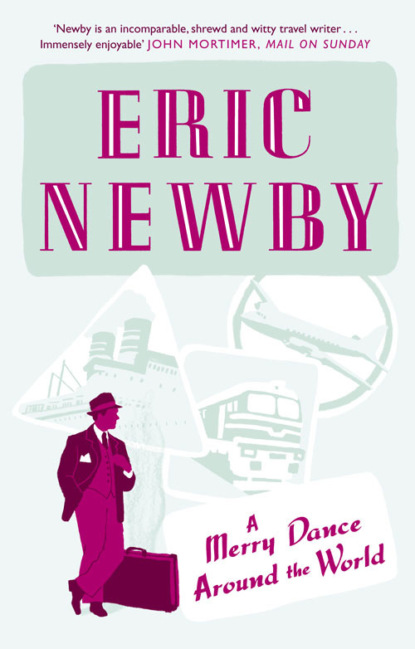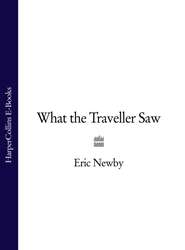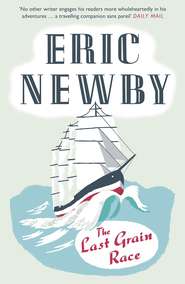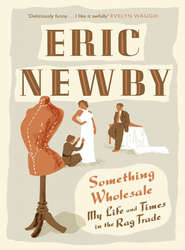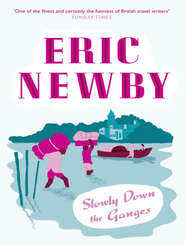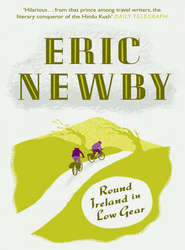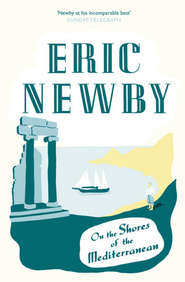По всем вопросам обращайтесь на: info@litportal.ru
(©) 2003-2024.
✖
A Merry Dance Around the World With Eric Newby
Автор
Год написания книги
2019
Настройки чтения
Размер шрифта
Высота строк
Поля
For many days we had been thinking of Christmas, which this year fell on a Sunday. There had been a good deal of grumbling about this in the fo’c’sle, but even Sedelquist, who knew his rights, and was always threatening to complain to the Finnish Consul over imaginary infringements, wasn’t able to suggest any satisfactory plan for moving Christmas Day to the following Monday in order to get an extra day’s holiday.
In the week before Christmas I was ‘Backstern’
(#ulink_116bde7c-44fb-5eed-a540-7a6861aadc4d) for the second time on the voyage. My job was to wash up for the twenty occupants of the three fo’c’sles whenever mine was a working watch. Kroner performed the same service when I was free. Besides being a romantic, Kroner was a great grumbler and every day he told me I had forgotten to dry the dishcloths in the galley. Every day I told him the same thing. Very often, on the occasions when we did remember to hang them over the range, they were knocked down by the coal-carrying party and trampled in the coal-dust. Kroner drew my washing-up water; I drew his.
To get sea-water for washing-up I tied a rope to a bucket, stood in the lee rigging of the foremast, and dropped it into the sea. Bäckmann had been the first person to do ‘Backstern’ in our watch and he had cast a new teak bucket into the sea on the evening of our spectacular dash into the Atlantic. With Moshulu running thirteen to fourteen knots it was lucky that he had not known how to attach the rope to the bucket in a seamanlike manner; if he had, the tremendous jerk when it fetched up at the end of a lot of slack would probably have pulled him over the side. As it was, the knot came undone and the bucket sank before the eyes of the First Mate and the Captain, who were interested spectators. I had been charged for a hammer. Bäckman was put down for a teak bucket.
With the water safely on deck my troubles were not over, for it still had to be heated over the galley fire, and if the ‘Kock’ didn’t like you he would move it as far as possible from the hot part of the stove. Like all cooks he was subject to sudden glooms and rages. It was unfortunate that he had taken a dislike to Kroner, who had been rude to him about some bacon instead of keeping his mouth shut and throwing it over the side, but he had nothing against me. Thanks to the ‘Kock’s’ misplaced malevolence, Kroner enjoyed a week of scalding and abundant water whilst I suffered lukewarm water one day, total loss on another, and on a third found a long sea-boot stocking stewing merrily away in a bucket topped with a yeasty-looking froth.
The washing-up basin was a kerosene can sawn in half, the sharp edges beaten down so that it looked like some revolting curio from an oriental bazaar. These were the days before detergents, and their place was taken by sand, with some ropeyarn as a scourer. The everyday work on the ship had already battered my hands beyond recognition so that they resembled bloodstained hooks; and now the salt water penetrated cuts and scratches, making them swell and split. There was a vivid and appropriate name for these sores which never seemed to heal.
It was an unspoken rule that the ‘Backstern’ washed up first in his own fo’c’sle in case he was called on deck by ‘två vissel’ – two whistles. After the port side was finished, he washed up for the starboard watch. Then for the daymen amidships. Theirs was a gloomy hole, without ports and filled with stale cigarette smoke, its only natural illumination a skylight, rarely opened, shedding a permanent dusk into it. To one side was a tiny rectangular table piled high with the most ghastly debris of après déjeuner: islands of porridge; lakes of coffee in which cigarette ends were slowly sinking; great mounds of uneaten salt bacon; squashed putty-coloured fish-balls, and, in the tropics, almost phosphorescent herring. At other meals mountains of bones and a warm feral smell made the fo’c’sle more like a lair of wild beasts than a human habitation.
On the Monday of Christmas week washing-up had been terrible. There was heavy rain and it had come on to blow hard. ‘Like sonofa-beetch, like helvete,’ said Sandell as he came from the wheel. I was pressed for time as I had second look-out, which meant washing up three fo’c’sles in less than an hour. Kroner, the damn fool, had forgotten to put the drying-up cloths in the galley and there was only one tin of hot water instead of three. To make things worse the ship was heeling at such an angle that it was impossible to stand upright.
I tore the tail off a good shirt, wedged the kerosene can against the rim of the table, and put each wet irreplaceable piece of crockery in the locker as I washed it. When I finished I took them all out, dried them, and put them back piece by piece. Around me the bunks were full of men trying to sleep, but the ship was a pandemonium of noise, the wind roaring in the rigging, the footsteps of the Officer of the Watch thumping overhead, the wheel thudding and juddering, and the fo’c’sle itself filled with the squeaks and groans of stressed rivets. From the hold came a deep rumbling sound as though the ballast was shifting. I dropped a spoon and five angry heads appeared from behind little curtains and told me to ‘Shot op.’ Eight bells sounded and it was my ‘utkik’, the hour of lookout on the fo’c’sle head.
There was a fearful sunset. The ship was driving towards a wall of black storm cloud tinged with bright ochre where the sun touched it. About us was a wild, tumbling yellow sea. South of us two great concentric rainbows spanned the sky and dropped unbroken into the sea. At intervals everything was blotted out by squalls of rain and hailstones as big and hard as dried peas. It only needed a waterspout to complete the scene.
Soon I became clammy and forlorn, gazing into the murk. It was dark now and the rain was freezing in the squalls. Above the curve of the foresail everything was black, and from the rigging, right up the heights of the masts came the endless rushing of the wind. To warm my hands I pushed them into the pockets of my oilskin coat and found two deep cold puddles. In one of them was my last handkerchief.
After an hour of ‘utkik’ I in my turn became ‘påpass’, the man who called the watch on deck if it was necessary and woke the next man relieving the helmsman. During my spell on the foredeck there were ‘två vissel’. Welcoming the opportunity to exercise my frozen limbs I flung open the fo’c’sle door and screamed, ‘Two vistle, ut på däck’ in the most hair-raising voice I could manage.
Inside, water was swirling pieces of newspaper and bread about the floor. It broke over Yonny Valker and Alvar, those primitive men sleeping down there, awash and shining like whales. The other five members of our watch were dozing perilously on the benches. Everyone was fully dressed in oilskins, too wet to get into their bunks. The oil-lamp was canting at an alarming angle and Bäckmann hit his head on it as he started up from the table. He didn’t feel anything because he was still asleep. One by one the others lurched out of the fo’c’sle, and as they encountered the blast on deck they cursed the owner for owning Moshulu, the Captain for bringing us here, the Mate for blowing his ‘vissel’, and me for being ‘påpass’ and hearing it.
Little Taanila was at the wheel, clinging to it like a flea, while the Mate tried to prevent it spinning and hurling him over the top on to the deck.
‘Två män till rors,’ shouted the Mate, and Bäckmann went as help wheel to Taanila.
‘Mesan,’ said the Mate and we tailed on to the downhaul of the largest of the three fore-and-aft sails on the jigger mast. It jammed, but we continued to take the strain. Suddenly it broke and we rolled in a wet heap in the scuppers.
‘That ploddy Gustav,’ said Sedelquist, speaking unlovingly of the owner who was reputed to be very close with ropes. ‘He vonts—’
By Friday the rain was wearing us all down. Breakfast was terrible. Black beans and fried salt bacon from the pickle cask. The margarine and sugar had both given out on Wednesday. We were ravenous and talked of nothing but food. But at noon Sandell reported that the hens had disappeared from the henhouse and that the Cook was making huge puddings. I saw them myself when I was fetching the washing-up water. They looked like sand castles. We were agog.
At last it was Saturday, 24th December, Christmas Eve. Christmas Eve was the principal Finnish celebration. It was our free watch in the morning, and now came the opportunity for the great ‘Vask’ in the slimy little ‘Vaskrum’; but the joy of putting on clean clothes was worth the discomfort. Even Yonny and Alvar had a ‘Vask’, and some of us whose beards had not been a success shaved. Then we put on our best clothes: clean dungarees, home-knitted jerseys, and new woollen caps. Bäckmann even put on a collar and tie. This was too much for the more rugged members of the watch, and a committee was formed to discuss the question. They were very serious about it and decided he was improperly dressed for the time and place. Nevertheless he continued to wear a tie, and presently I put one on myself, with a tennis shirt and flannel trousers with the mud of Devon lanes still on the turn-ups. It was wonderful to wear clothes that followed the contours of the body after so many weeks of damp, ill-fitting garments. In the splendour of our new robes we slept till noon. Then, except for wheel and look-out, work ceased for everyone.
Like the apprentices in A Christmas Carol preparing the warehouse for the party, we put the finishing touches to the fo’c’sle. Bäckmann washed the paint with hot water and green soap. I removed a large number of bugs from the bunkboards and drowned the eggs. Taanila scrubbed the floor; Hermansonn polished our door-knob, while the others removed horrid debris from the unoccupied bunks and shook all the blankets on deck. The floor and tables were washed with hot soda and burnished white with sand. Then we sat down and looked around at what we had done. It did seem more like home. It would need to for tonight to be a success. ‘Like home,’ said Sedelquist. ‘Like hell.’
At half past one I threw the last lot of washing-up water over the side. My week of ‘Backstern’ was over for a whole month, and I was heartily sick of it. Cleaning the ‘skit hus’ was preferable. From three until four I was at the wheel. The wind was ENE and the ship steered herself except for a slight touch from time to time. The afternoon was cold, the decks were deserted. Everyone was below having haircuts, shaving, trimming beards, or squeezing pimples. Just before I was relieved the First Mate came on deck. A startling transformation had been effected in him. He was no longer grimy-looking; the ginger beard and moustaches that had given him so much the appearance of a Cheshire Cat had disappeared. Instead he was very stiff and self-conscious in a gold-braided reefer suit, his head bowed beneath an enormous peaked cap, also gold-braided, on which was pinned the white house badge, a white flag with G.E. in black letters on it. With dismay I realized that without the beard his was not the sort of face I cared for at all. Indecently bare, it was shorn of its strength. I think he realized this, for he giggled, almost apologetically. This moment marked the beginning of a certain coolness in our relationship.
‘Coffee-time’ brought the first fragments of a great avalanche of food. On Saturdays the bread was always different; today it arrived in the shape of scones. There were a great number, they were very good, and we ate the lot in seven minutes.
As the dinner hour approached the agony of waiting became almost unbearable. We roamed about the fo’c’sles like hungry lions. Outside, the rain beat down on the deck. The weather had broken up soon after five, but the wind blew steadily and we were all confident that there would be no work on deck unless it shifted. Otherwise the ship would carry topgallants and topmast staysails throughout the night. When it grew dark, at seven o’clock, ‘tre vissel’ summoned all hands. We crowded the well-deck. Looking down on us was the Captain, all braid and smiles; the First and Second Mates, less braid and fewer smiles; and Tria, no braid but more smiles than all of them put together. I had never seen such splendid uniforms.
The Captain made a little speech. Addressing us as ‘Pojkar’ (Boys), he wished us ‘God Jul’ and told us to come aft to his saloon after dinner. When he had finished we tipped our caps to him, mumbled our thanks, and made a rush below. Two sheets were produced and spread on the table. We gathered all our lamps and lanterns and hung them round the bulkheads.
The food was brought in from the galley. Great steaming bowls of rice and meat; pastry, sardines, salmon, corned beef, apricots, things we had forgotten. A bottle of Akvavit and the set piece, a huge ginger pudding, its summit wreathed in steam.
There were maddening moments of delay while I took what proved to be a series of unsuccessful photographs. Then we made a dash for the table. From then on there were few sounds other than the smacking of eight pairs of lips and an occasional grunted request to pass a dish. We had been hungry for weeks and now our chance had come. After the traditional Finnish rice-porridge I worked through potato pastry, chopped fish, and methodically round the table to the ginger pudding, which was sublime, the zenith of the evening. Alvar, appointed wine steward, circled the table allowing us half a mug of Akvavit each, and the starboard watch, who had already eaten, came in in bunches to cry ‘God Jul, Pojkar!’
When the others had given up, Sandell and I were still plugging on steadily. He turned to me, his face distorted by a great piece of pudding, a little rice gleaming in his black beard. ‘To spik notting and eat, is bettair,’ he said and carved himself a slice of Dutch cheese. We all loved one another now. Even Sedelquist offered me an old Tatler containing a photograph of the Duchess in Newmarket boots and raincoat at a very wet point-to-point.
‘Oh, say you. I think he is fon in bed, yes?’
‘No.’
I took a good look at the Duke gazing myopically over her shoulder before I remembered that Sedelquist always got his genders mixed.
Each of us had been given a green tin of Abdullah cigarettes. Shaped to fit the pocket, they held fifty; on the lid, in large letters, was inscribed ‘Imperial Preference’. There were additional charms: each one contained a coloured picture of a girl in an inviting posture, more accessible than the Duchess. After dinner brisk business was done in exchanging one for another, and Sedelquist emerged with the best collection. Although I didn’t really like cigarettes I smoked half-a-dozen in rapid succession in order not to miss anything.
From the midships fo’c’sle came the sound of a Christmas hymn being sung rather well in Swedish and we all went to listen. The singers were seated with their backs to the bulkhead near the Christmas tree which ‘Doonkey’ had made from teased-out rope yarns. There were five of them sharing three hymn books and they all sang with great earnestness. Among them were Kisstar the Carpenter, the light of the oil-lamp softening the deep lines on his face; Reino Hörglund with his great black beard; and Jansson, thick-lipped and tousled. Half of the fo’c’sle was in shadow and I stood in darkness by the huge trunk of the mainmast; next to me stood Yonny Valker, hands clasped before him like a peasant before a roadside altar. We were all very homesick.
At nine o’clock we queued up outside the Captain’s stateroom to receive our Christmas presents from the Missions to Seamen. This was the first time I had seen the Officers’ quarters, which seemed very warm and substantial compared with our own. From somewhere the almost legendary wireless was emitting dance music with the background of peculiar rushing and whining sounds that accompany music across great expanses of ocean. Whilst we waited in this unaccustomed place I noticed with envy the magnificence of the washing-up arrangements, the scullery with an elaborate draining-board, and the abundance of dry dish-cloths. I thought then how easy it would be to provide something similar for the fo’c’sles, how much saving of time.
When it was my turn to enter the ‘Great Hall’ I felt very serf-like and nervous, but my premonitions were soon dispersed. Inside it was all red plush, banquettes, and brass rails, very like the old Café Royal. I almost expected to see Epstein instead of the smiling and very youthful-looking Captain seated at the mahogany table, his officers around him. He held out a hat to me, full of pieces of paper. The one I took was Number 7. ‘Number 7 for England’s Hope,’ said the Captain, and the Steward who was kneeling on the floor surrounded by parcels handed me the one with 7 on it. I wished everybody ‘God Jul’ and backed out of the stateroom in fine feudal fashion, stepping heavily on the toes of the man behind me, and dashed eagerly back to the fo’c’sle to open it.
Inside the paper wrappings was a fine blue knitted scarf, a pair of grey mittens, and a pair of stout brown socks. When I picked up the scarf three bits of paper fell out. One of these was a Christmas card with ‘Jultiden’ in prominent red lettering on one side and on the other, in ink, ‘och Gott Nytt År, onskar Aina Karlsson, Esplanadgarten 8, Mariehamn.’ On the other two pieces was the text of St John, Chapter 20, in Finnish, and the good wishes of the Missions to Seamen who had sent the parcel. Right at the bottom was a hand mirror and comb.
I thought of Aina Karlsson knitting woollies with loving care for unknown sailors in sailing ships. We all eagerly compared our presents. Some had thicker garments, some larger. Sedelquist said that the Mates had already appropriated the best, but no one paid any attention to this. Among us Taanila had the finest haul – a woollen helmet that pulled over head and ears with a long scarf attached. It made him look like a fiendish Finnish gnome.
In the midships fo’c’sle there were two miserable people, Essin and Pipinen. Essin, the Sailmaker’s assistant, had broken one of his molars in the general struggle to eat everything within reach. He now lay groaning in his bunk, his face swathed in mufflers. I tried to plug the cavity with gutta-percha, which on the advice of my dentist I had brought with me in anticipation of such an emergency. It had looked easy in Wimpole Street when he demonstrated how to do it: he put a little vaseline on a plugger, heated the gutta-percha and popped it in the hole. Now, overcome with wine and food, in a swaying ship, by the murky light of a hurricane lamp I felt like a tipsy surgeon about to perform a major operation. Worse still, the patient kept flinching and I dropped a blob of bubbling hot gutta-percha on his tongue. He leapt into the air screaming and three boys had to hold him down while I tried to push a cooler piece into the hole. But it would not stay in, and I gave him an overdose of aspirin and hoped for the best. The operation had not been successful.
Pipinen, the other casualty, had cut his hand badly while opening a tin of apricots and Karma, the unpredictable Finn, was fixing it with fathoms of bandage. Hilbert told me that Karma would not cut the bandage because he had bought it for himself. When I left, Pipinen’s hand was as big as a football and Karma still had yards left.
I went in search of my bunk. It was 9.45. By some miracle I was neither ‘rorsman’ (helmsman), ‘utkik’, nor ‘påpass’. I crawled into my bag and slept dreamlessly until four in the morning, when a voice cried ‘resa upp’; but Sandell closed the curtains and I slept on until half past seven. There were loud cheers when I woke. I had slept ‘like sonofabeetch, like peeg in straw’. Ten hours – the longest sleep I ever had in Moshulu, or anywhere else. I was quite thrilled.
On Christmas morning the weather was cold and brilliant. Big following seas were charging up astern in endless succession. They surged beneath the ship, bearing her up, filling the air with whistling spray as their great heads tore out from under and ahead to leave her in a trough as black and polished as basalt except where, under the stern post, the angle of the rudder made the water bubble jade-green, as if from a spring. From the mizzen yardarm, where I hung festooned with photographic apparatus, I could see the whole midships of Moshulu. On the flying bridge above the main deck the Captain and the three Mates were being photographed by the Steward, solemn and black as crows in their best uniforms.
Rigid with cold I descended to eat Christmas dinner, for which the ‘Kock’ had made an extra sustaining fruit soup. For breakfast we had had Palethorpe’s tinned sausages which were very well received; at ‘Coffee-time’ apple tarts and buns but not enough of either; and for supper, rice, pastry, and jam. At four a.m. on what would have been Boxing Day in England we were setting royals once more. The party was over.
Eighty-two days out from Belfast we anchored in Spencer Gulf in south Australia, having sailed 15,000 sea miles. We were three months in Australia. At first sweltering at anchorage waiting for a freight to be fixed, so that we could load a cargo of grain somewhere in Spencer Gulf, which runs up into the heart of the wheat belt, then, when hope had almost been given up of fixing a freight for any of the ships, and we had visions of sailing home in ballast or being sold with the ships like a lot of slaves, all the ships got freights and Moshulu was ordered to load a cargo at Port Victoria on the other side of the gulf at £1.37½6 ($6.34) a ton – in 1938 she had loaded nearly five thousand tons at £2.06 ($10.30) a ton. The Spencer Gulf was a hell of a place, wherever you were in it in summer, plagued by flies and an appalling wind as hot as a blast furnace which poured down through it from the deserts of the interior, causing Moshulu and other ships to drag their anchors. To go ashore, we rowed and sailed eight miles to Port Lincoln and eight miles back. I found a lot of letters waiting for me and I sent my parents a telegram which read ‘Muscular, happy, penniless’ and got some money by return.
We sailed from Port Victoria at 6.30 a.m. on 11 March 1939, our destination Queenstown in southern Ireland (now Cobh), for orders, by way of Cape Horn. We were, in fact, taking part in the 1939 sailings of what was known as the Grain Race. This year turned out to be the Last Grain Race.
On the second Friday (having crossed the 180th meridian – the international dateline – there were two Fridays), running the easting down, Moshulu’s noon position was 51°S, 176°W, 13 days and 2440 nautical miles out from Port Victoria. In 23½ hours she had sailed 296 miles, the best day’s sailing with cargo she ever had with Erikson.
(#ulink_4db7a01e-880f-5c89-9980-eedcecc869a4) At 5.30 in the morning, Moshulu, still carrying her upper topgallants, began to labour under the onslaught of the heavy seas which were flooding on to the deck like a mill race. It was quite dark as six of us clewed-up the mizzen lower topgallant, and although from where I was at the tail of the rope I could see nothing at all except the hunched shoulders of Jansson ahead of me, I could hear Tria at the head of the line exhorting us. The sail was almost up when the wind fell quite suddenly and we all knew that we were in the trough of a wave far bigger than anything we had yet experienced. It was far too dark to see it at a distance, we could only sense its coming as the ship rolled slightly to port to meet it.
‘Hoold …’ someone began to shout as the darkness became darker still and the sea came looming over the rail. I was end man. There was just time to take a turn with the clewline round my middle and a good hold, the next moment it was on top of us. The rope was not torn from me; instead it was as though a gentle giant had smoothed his hands over my knuckles. They simply opened of their own accord and I unravelled from it like a cotton reel from the end of a thread and was swept away. As I went another body bumped me, and I received a blow in the eye from a seaboot. Then I was alone, rushing onwards and turning over and over. My head was filled with bright lights like a by-pass at night, and the air was full of the sounds of a large orchestra playing out of tune. In spite of this there was time to think and I thought: ‘I’m done for.’ At the same time the words of a sea poem, ‘ten men hauling the lee fore brace … seven when she rose at last’, came back to me with peculiar aptness. But only for an instant because now I was turning full somersaults, hitting myself violently again and again as I met something flat which might have been the coaming of No. 4 hatch, or the top of the charthouse, for all I knew. Then I was over it, full of water and very frightened, thinking ‘Is this what it’s like to drown?’ No more obstructions now but still going very fast and still under water, perhaps no longer in the ship, washed overboard, alone in the Southern Ocean. Quite suddenly there was a parting of water, a terrific crash as my head hit something solid, and I felt myself aground.
Finding myself in the lee scuppers with my head forced right through a freeing port so that the last of the great sea behind me spurted about my ears, I was in a panic that a second wave might come aboard and squeeze me through it like a sausage, to finish me off.
Staggering to my feet, my oilskins ballooning with water, too stupid from the blow on my head to be frightened, I had just enough sense to jump for the starboard lifeline when the next wave came boiling over the port quarter and obliterated everything from view.
Swinging above the deck on the lifeline with the sea sucking greedily at my seaboots, I began to realize what a fortunate escape I had had from serious injury, for the alacrity with which I had leapt for the lifeline in spite of the great weight of sea-water inside my oilskins had convinced me that I had suffered no damage except the bang on the head.
The sea had taken me and swept me from the pin rail of the mizzen rigging, where I had been working, diagonally across the deck for fifty feet past the Jarvis brace winches, on the long handles of which I could so easily have been speared, over the fife rails of the mizzen mast, right over the top of No. 3 hatch and into the scuppers by the main braces outside the Captain’s quarters.





